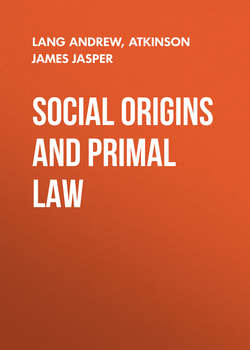Читать книгу Social Origins and Primal Law - Lang Andrew - Страница 20
CHAPTER III
TOTEMS WITHIN THE PHRATRIES
AMERICAN SUPPORT OF THE AUTHOR'S HYPOTHESIS
ОглавлениеThe system which I advocate here, as to the smallness of the original human groups, and their later combination into larger unions, seems to have, as regards America, the support of the late Major Powell, the Director of the Bureau of Ethnology, and of Mr. McGee of the same department. This gentleman writes, 'Two postulates concerning primitive society, adopted by various ethnologic students of other countries, have been erroneously applied to the American aborigines … The first postulate is that primitive men were originally assembled in chaotic hordes, and that organised society was developed out of the chaotic mass by the segregation of groups …' This appears to be Mr. Hewitt's doctrine. In fact, Mr. McGee says, American research points, not to a primal horde, 'bisected' and 'subdivided' into an organised community, but to an early condition 'directly antithetic to the postulated horde, in which the scant population was segregated in small discrete bodies, probably family groups…' The process of advance was one of 'progressive combination rather than of continued differentiation… It would appear that the original definitely organised groups occasionally coalesced with other groups, both simple and compound, whereby they were elaborated in structure…' Mr. McGee adds, 'always with some loss in definiteness and permanence.' As far as concerns Australia, I do not feel sure that the last remark applies, but, on the whole, Mr. McGee's observations, couched in abstract terms, appear to fit what I have written, in concrete terms, about the probable evolution of Australian tribal society.87
The theory thus suggested makes little demand on deliberate legislation, as we shall see later.
87
Ethnological Bureau, Annual Report, 1893-1894, pp. 200, 201.
